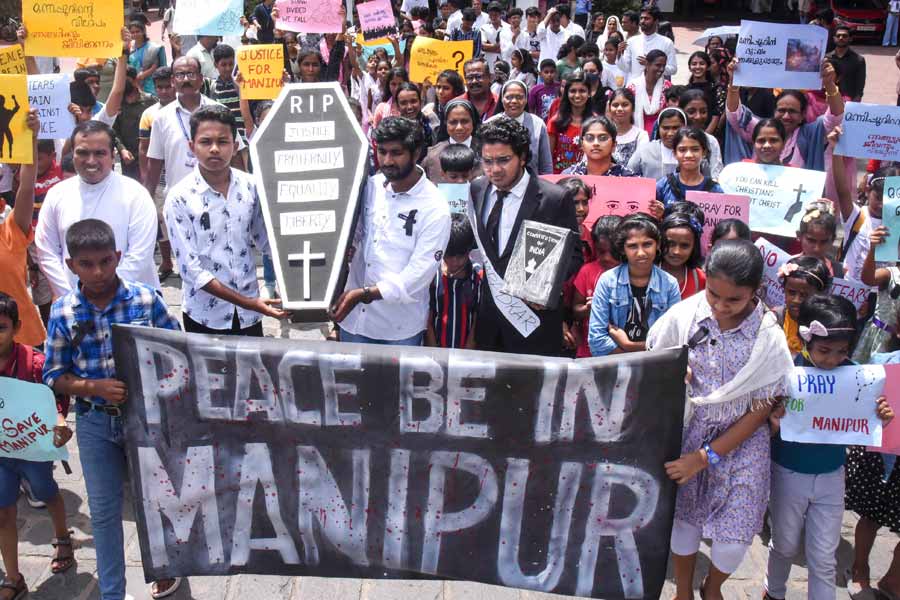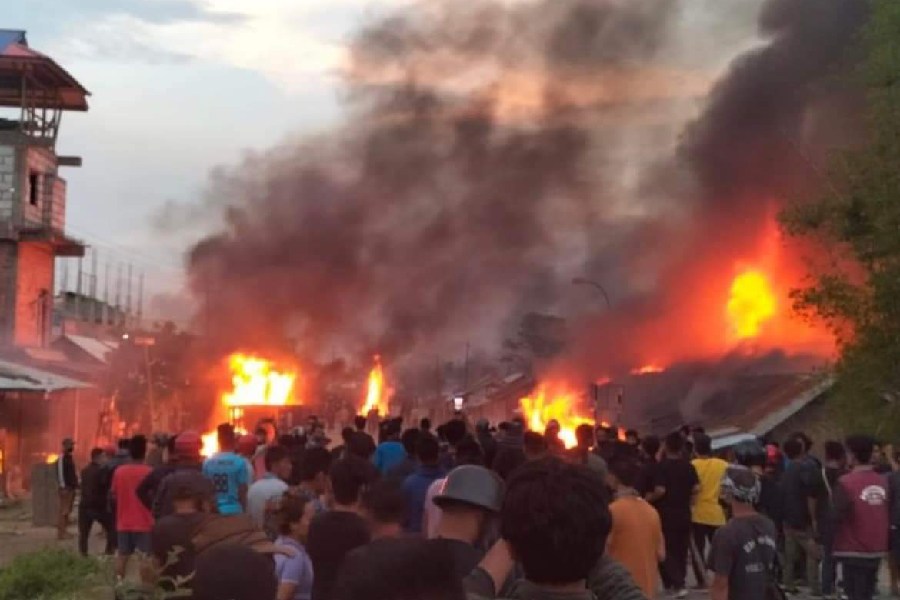A report of the Karwan e Mohabbat (Caravan of Love), a citizens’ initiative that strives to reach out to victims of hate crimes, has observed that the state and central governments were “almost completely absent from the relief camps” in strife-torn Manipur.
The Karwan e Mohabbat team visited five relief camps between July 25 and July 28 to assess the humanitarian crisis and highlight the suffering and demands of those internally displaced in Manipur and shared its findings in a 31-page report. Titled The Humanitarian Crisis in Manipur, the report was published on www.sabrangindia.in on Saturday.
In its report, Karwan stated: “The Karwan team observed that the state and the central governments were almost completely absent from the relief camps. (There is currently only one camp, located in the Imphal valley, that is being run completely by the state government). They have failed not just in their primary duty of protecting civilians, but were also culpably absent from relief and rehabilitation efforts.”
The BJP heads the governments in Manipur and at the Centre.
Manipur has been in turmoil since May 3 after a solidarity rally was held in the Kuki-dominated hills opposing the demand of the majority Meitei community for inclusion in the Scheduled Tribes list. At least 168 were killed and over 67,000 displaced from both communities.
The situation remains volatile even now despite the heavy presence of central forces. There are no signs yet of a road map to restore normality.
Camp ‘disparity’
Karwan, which was launched in 2017 by rights activist and former IAS officer Harsh Mander, flagged a “visible disparity” between the condition of the Meitei camps and the Kuki camps.
“It was apparent that Meitei camps were being run with some government support — either sponsored by the local MLA or established in government buildings like colleges and sports complexes. This was not the case with the Kuki camps which were mainly being managed by the local church and supported by the community’s contributions,” the report said.
As the conflict continues with no end in sight, the report said “families who gave shelter to displaced persons are now encouraging people to shift to relief camps. The population of the relief camps is likely to steadily grow further, especially in the hills, and the consequent pressures on the community organisations that are organising the relief work are likely to grow even further”.
A church elder involved in the relief efforts in the state told The Telegraph on Sunday that the condition of the relief camps was better in the Imphal valley than those in the hills, especially in Tengnoupal and Kangpokpi.
According to a report submitted by the state government in the Supreme Court in July, 354 relief camps in Manipur were sheltering 54,488 people as on July 4, with the highest number of camps (102) in Churachandpur, housing 14,816 inmates.
Apart from this, neighbouring Mizoram is hosting 12,882 internally displaced people from Manipur.
‘War zone’
“Nothing indeed had prepared us for what we bore witness to. We found a Manipur almost fully transformed into a war zone, bursting with sophisticated rifles, mortars, bombs, and massive daily mobilisation of ordinary civilians. Entire villages of both warring communities have been razed to ashes,” the Karwan report said.
The report said the state government is often perceived to be taking sides in what is quickly escalating into a full-blown civil war. “...The grief in both Meitei and Kuki camps almost mirrored each other,” it said, alleging the state government has “done nothing to establish and support the relief camps, especially for an estimated 20,000 Kuki internal refugees”.
“It is largely the local church, supported by local contributions, that is running more than a hundred Kuki relief camps. Children in these have been reduced to eating watery rice with salt. Signs of malnutrition are already unmistakable. No camps have temporary schools. The refusal of the state (and central governments) to establish camps with basic services of safety, sanitation, nutrition, education and health care is another disgraceful abdication by the state of its fundamental constitutional duties,” the report said.
Suggestions
The Karwan report said since there was “little chance today” that the relief camps would be wound up and normality restored in the coming months, the “focus of our report is on the humanitarian crisis of the internally displaced persons, and what we are convinced must be done immediately to alleviate and prevent further human suffering in Manipur”.
The team has suggested that the Union and state governments announce a comprehensive relief and rehabilitation programme for “all affected people”, the “running of humane and dignified relief camps” and help people affected by the violence “rebuild their homes and habitations in accordance with their wishes”.
The state administration must directly administer all relief camps in both the valley and the hills, bear the cost of food and other facilities and take the help of premier mental health institutions like NIMHANS, Bangalore, to help the affected, it added.
The report has mooted “visible peace-building measures” between the two communities, starting with the safe return of the bodies in morgues and continuance of relief camps “for as long as the residents do not feel safe to return to their normal lives of the past”.


